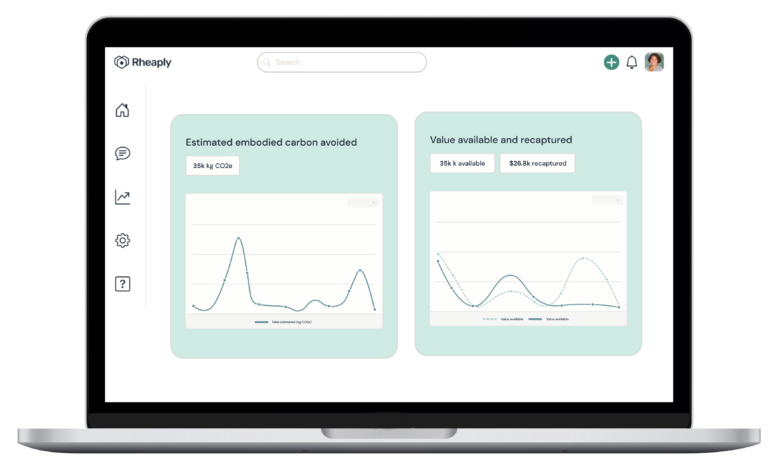ESG Sustainability Reporting
Rheaply puts reuse on the table for every organization.
ESG Sustainability Reporting
ESG sustainability reporting is the transparent disclosure of a company’s impact on vital non-financial factors that concern our global society. This trend towards a greater focus on ESG reporting reflects an international shift in understanding that businesses are obligated to address challenges such as climate change, social inequality, and corporate ethics.
What is ESG reporting?
ESG, which stands for environmental, social, and governance, refers to the set of business activities that concern each area. When businesses report on their ESG activities, they communicate quantifiable measures of their environmental, social, and governance performance.
The “environmental” component in ESG deals with ecological considerations, such as how a company minimizes its carbon footprint and promotes energy efficiency. “Social” encompasses matters like human rights, labor standards, and employee health and safety. The “governance” aspect relates to the company’s leadership and overall transparency.
An ESG report is a comprehensive document that shares insights into a company’s management and performance in each of these areas. By studying an ESG report, stakeholders can gauge the company’s dedication to sustainability and social responsibility, assessing whether or not it’s meeting its stated ESG goals.
The significance of ESG sustainability reporting in the modern business landscape cannot be overstated. Good ESG performance can improve a company’s brand reputation, build customer loyalty, and even boost long-term financial performance. Reports allow investors to make informed decisions, understanding that sound ESG performance can often translate into sustainable financial returns on investment.
Governments and regulatory bodies worldwide are also coming to recognize the importance of ESG reporting. Many are introducing ESG reporting requirements to ensure companies are accountable for their impact on society and the environment. These requirements vary by jurisdiction and industry, but generally include disclosures on a company’s environmental impact, labor practices, and corporate governance structures.
Implementing a reuse platform like Rheaply is a great way for organizations to stay on top of their ESG reporting initiatives. With Rheaply, businesses can enjoy benefits like cost savings and increased employee engagement while making sure everyone is in alignment with their most critical sustainability goals.

ESG Reporting Standards
ESG reporting standards are guidelines and principles established to help businesses report on their ESG performance in a consistent and comparable way. These standards are crucial, as they provide a common language for ESG reporting. This makes it easier for stakeholders to understand and compare ESG performance across different companies.
Here’s a list of ESG reporting frameworks that are widely used in the business world:
- Global Reporting Initiative (GRI): One of the earliest and most widely-adopted ESG reporting frameworks, the GRI provides a comprehensive set of standards covering a broad range of ESG topics. It encourages businesses to report on their most significant impacts, ensuring that stakeholders have access to complete information.
- Sustainability Accounting Standards Board (SASB): The SASB provides industry-specific standards focusing on financially-material ESG issues. It helps businesses identify, manage, and report on the ESG factors most relevant to their financial performance.
- Task Force on Climate-Related Financial Disclosures (TCFD): The TCFD’s framework encourages companies to disclose their financial risks and opportunities related to climate change.
- Integrated Reporting Framework (IR): Developed by the International Integrated Reporting Council (IIRC), the IR framework promotes the integration of financial and non-financial information in a single, concise report.
- CDP (formerly Carbon Disclosure Project): The CDP focuses on environmental disclosure, specifically related to climate change, water security, and deforestation. Companies use the CDP to report detailed information about their environmental impacts, risks, and opportunities.
- UN Global Compact: Although not a reporting standard per se, the UN Global Compact helps businesses align their operations with ten universally-accepted principles in the areas of human rights, labor, environment, and anti-corruption.
While each ESG reporting framework has its own focus and approach, all aim to promote transparency, accountability, and sustainable business practices. Different frameworks may apply to different types of businesses, depending on their industry, size, location, and so forth.
SEC Climate Disclosure Rule
The regulatory world of ESG reporting is rapidly evolving, reflecting the increasing recognition of the importance of ESG performance. Among this landscape is the trend toward mandatory ESG reporting and the growing involvement of securities regulators like the U.S. Securities and Exchange Commission (SEC).
The SEC has traditionally required publicly-traded companies to disclose material information—data that a reasonable investor would consider important in making investment decisions. Recently, the SEC has turned its attention to ESG factors, particularly climate change, acknowledging that these issues can significantly impact a company’s financial condition and operating performance.
In response, the SEC introduced the SEC climate disclosure rule. This rule aims to provide investors with more reliable information about climate-related risks. SEC ESG disclosure requirements now call for companies to include information about their greenhouse gas emissions and how their business models might be affected by climate change in their annual filings.
Is ESG reporting mandatory?
It largely depends on the jurisdiction. For instance, the European Union has implemented the Non-Financial Reporting Directive (NFRD). This requires large companies to disclose certain information on the way they operate and manage social and environmental challenges. Other mandatory ESG reporting countries include the UK, which has implemented similar rules to the NFRD, and Canada, which is considering making climate-related disclosures mandatory.
This global shift towards mandatory reporting reflects the growing consensus that companies have a significant role to play in addressing ESG challenges. Mandatory reporting ensures that all companies, regardless of their size or industry, take these issues seriously and contribute to global sustainability efforts.
ESG Reporting Examples
Circular economy and reuse activities play an integral role in ESG sustainability reporting because they directly address environmental sustainability. The circular economy model aims to eliminate waste and advocates for the continual use of resources. Reuse is the process by which items are used more than once in their same form to conserve resources. Both principles can significantly improve a company’s ESG performance.
In the context of ESG reporting, these principles can be reflected in a number of ways. For example, a company might report on its efforts to minimize waste, reuse materials, or design products for recyclability. It might also report on partnerships with recycling companies or commitments to using recycled materials in its products. These initiatives can help reduce a company’s environmental footprint.
ESG reporting examples demonstrate the importance of these processes. For instance, a technology company might report on its product take-back program, which encourages customers to return old devices for recycling or refurbishment. Similarly, a clothing manufacturer may report on its commitment to using recycled materials or creating garments that are designed to be easily repaired, reused, or recycled.
To effectively implement these practices, businesses can turn to ESG framework examples for inspiration. The GRI provides specific standards for reporting on waste and materials, as does the SASB. Businesses should carefully study these frameworks to become familiar with best practices for sustainability.
One of the ways businesses demonstrate their successful incorporation of circular economy principles is by generating a report. They can use ESG report sample for help getting started. Such samples often detail a company’s specific goals related to waste reduction or resource efficiency, the strategies it uses to achieve these goals, and its progress thus far. The report might also include data on the quantity of materials reused or recycled.
A notable ESG annual report is the Microsoft Corporate Social Responsibility (CSR) report, which showcases the company’s commitment to addressing a wide range of ESG issues, such as carbon neutrality, digital inclusion, and responsible AI. The report stands out for its data-driven approach, utilizing quantitative metrics and performance indicators to track progress toward sustainability goals.
New ESG Regulations
The future of ESG sustainability reporting is likely to be shaped by several emerging trends and developments, including new regulations and technological advances. Businesses should watch for new trends in their respective countries. For example, organizations operating in the United States should be aware of ESG regulations in the US, as well as any other rules that apply to them.
So when will ESG reporting become mandatory across the board? While the timeline varies by jurisdiction, there is a clear global trend toward mandatory ESG reporting. In the European Union, large companies are already required to disclose certain ESG information under the Non-Financial Reporting Directive. Other jurisdictions, including Canada and several Asian countries, are also moving towards mandatory ESG reporting. It is expected that more countries will introduce similar regulations in the coming years.
The introduction of new ESG regulations is likely to be accompanied by a growing focus on the circular economy. As concerns about resource depletion and waste continue to grow, companies are increasingly shifting away from a “take-make-waste” model and adopting the circular model that emphasizes the reuse and recycling of materials.
ESG reporting is no longer a corporate afterthought—it’s an essential aspect of contemporary business practice. Companies worldwide are coming to understand the value in transparently communicating their ESG impacts. With mandatory reporting becoming more commonplace and businesses increasingly embracing circular economy principles, the importance of comprehensive and credible ESG reporting cannot be overstated.
It’s become more important than ever for companies to be aware of these trends, adapt accordingly, and commit to enhancing their ESG performance. In doing so, they not only meet evolving regulatory and stakeholder expectations but contribute to a more sustainable and resilient global economy.
While getting started with proper ESG reporting can be tricky, platforms like Rheaply help make things easier. With Rheaply, businesses can gain greater visibility into their resources so they know what’s being used for various purposes, thus contributing to the circular economy.


